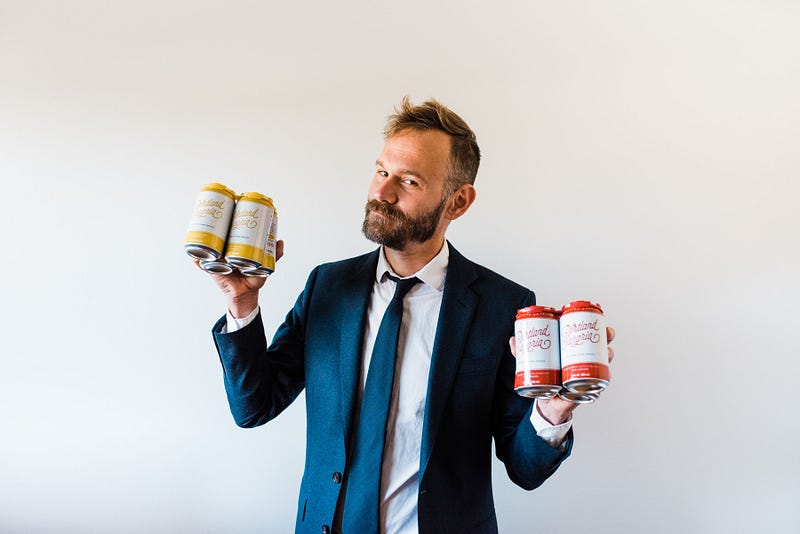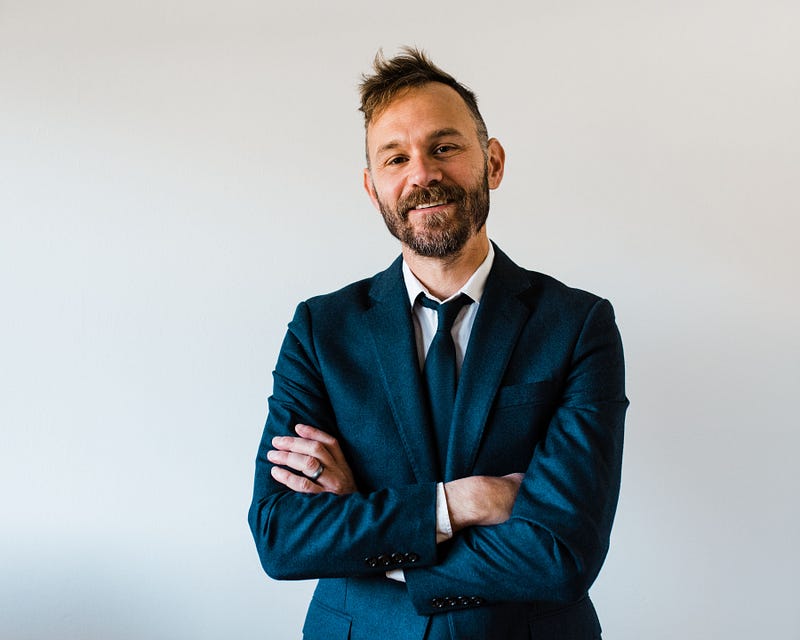
As part of my series about prominent entrepreneurs and executives that overcame
adversity to achieve great success, I had the pleasure of interviewing Ryan Sharp, serial entrepreneur, winemaker, musician and coach. He launched one of the first urban wineries in Portland, OR in 2011 and makes a canned wine spritzer called Portland Sangria. His canned sangria has been doted on by several publications and tastemakers.
Jason Crowley: Thank you so much for doing this with us! Can you tell us the “backstory” about what brought you to this specific career path?
Ryan Sharp: Let’s be clear: I had no background in winemaking — only a passion for wine. I had been a home brewer when I lived in San Francisco and loved putting my unique spin on age-old recipes.
When I launched ENSO, my urban winery in Portland several years later, that is exactly what I did. I took an age-old concept and put my own unique spin on it. It wasn’t just that I worked with unusual varietals and made unheard-of blends, I actually designed the entire winery to be modeled after the brewpub concept where production and retail overlapped. It was certainly not your typical winery.
We launched a local product out of our winery called Portland Sangria. It was a refreshing blend of light wine and fresh northwest juices. We packaged it in these nifty plastic pouches that had a tap. Retailers and customers alike loved how simple and portable they were and we sold out of our first run in about a month that first year.
The following year, we quadrupled our production. We invested in a machine that would automatically fill the bags and we streamlined our design. Anything seemed possible and everything seemed on-track. People were really connecting to our unique spin on how sangria could be made.
Crowley: Can you share your story of when you were on the brink of failure? First, take us back to what it was like during the darkest days.
Sharp: The calls started coming in within weeks of release that second year.
“The pouches are exploding,” I recall one wine steward saying. I had no idea what was going on. I asked my retailers to throw them all away and told them I would replace them with fresh pouches. I was told a story about how one of our retail partners was wandering by the dumpster in the afternoon heat and a bag exploded and shot sticky liquid up out of the dumpster and fell on her. This was bad.
I had another batch of sangria that was ready to be packaged, so I began running it through a very fine filtration device so as to remove any sort of bacteria or yeast that is natural to wine. They were clearly causing some sort of re-fermentation and creating the CO2 which was expanding the pouches. Those bacteria and yeast are fine in stable red wines, but we were creating a product that still had sugar — ie. food — for those microscopic beasts. So we needed to get rid of them entirely.
Still, as we continued to produce batch after batch that summer, the pouches would always eventually bloat and eventually explode. And in the end, I had to recall every single one of them and haul them to the dump to dispose of them. Back-breaking. Heart-breaking.
I figured the brand was done for.

Crowley: What was your mindset during such a challenging time? Where did you get the drive to keep going when things were so hard?
Sharp: I continued to approach the situation from a scientific, chemistry perspective. The problem I was trying to solve was this re-fermentation issue. But when the final bags were pulled and the season was over, I tried to take a broader perspective. I knew that there was some way to understand what had been happening. I went over and over our checklist and just couldn’t find fault.
I had a brand that people loved. I had a retail support network that — even after throwing away case after case of these pouches — was still asking for more.
Truthfully, I thought about throwing in the towel. And then a colleague mentioned a more suitable package for our Portland Sangria: The aluminum can. The thing about cans is that they can be pasteurized and they can be carbonated. Those two problems would solve our instability issues because they would halt any sort of re-fermentation.
We had a path!
Crowley: Tell us how you were able to overcome such adversity and achieve massive success? What did the next chapter look like?
Sharp: We immediately began researching this new packaging strategy and found a local partner to help us. Buying cans isn’t the same as buying pouches. You can buy a couple thousand pouches at a time, but a can order starts at 100,000 cans. We had never done that sort of volume before.
But we were up for the challenge and we were greatly rewarded for taking that risk.
Within the first few weeks of the release of the new canned Portland Sangria, we had already outsold what we had done in all previous years. People loved the familiarity of it and this was in the very early days of wine-in-can, so it was quite novel.
After a full season of success with the new packaging, we sought distribution for our products. Up to this point, we had been handling distribution mostly on our own. We found the biggest, most reputable wine distributor in Oregon and got set up for the following year.
We redesigned our packaging one last time, created two additional flavors and hit the ground running in year four. Instant state-wide success! People could not get enough of it. And we are now distributed in multiple states across the US.
And the cans? They never spoiled. They never bloated or exploded. They were the packaging this product was meant to be in!
Crowley: Based on your experience, can you share 3 actionable pieces of advice about how to develop the mindset needed to persevere through adversity? (Please share a story or example for each.)
Sharp: Don’t give up, but do be flexible. When it may feel like it’s time to throw in the towel, it may actually be time to talk with other people you respect about what your additional options may be. Get some fresh perspective. Stop what you are doing and take a break to regroup. Let go of any sort of limiting “this is how it has to be” thinking.
Figure out what is essential and what isn’t. When we were going through this process, we really had to ask, “What is this product and why do people connect with it?” Was it the pouch with the tap? Was it the unique blend of wine and juice? Was it it’s portability? Was it shear novelty? When we realized that portability is what led us to put it in pouches instead of bottles, we were able to keep portability as an essential item and search for other portable options. People weren’t married to the pouch; they were married to the convenience.
The obstacle is the way. The challenge is the teacher. As is often the case, the trial is what allows for a new way of thinking or approaching a situation. Success is a lousy teacher, as they say. A hiccup allows you to assess and improve. So take it as an opportunity! We had never considered aluminum cans when we started, but as it turns out, they are cheaper, more durable, more environmentally-friendly and allowed us to design them visually more on our terms.
Crowley: None of us are able to achieve success without some help along the way. Is there a particular person who helped get you to where you are? Can you share a story about that?
Sharp: While it may not always be easy for me to ask for help, I am happy to ask for input. And turns out, I got a lot of help and input along the way. Many friends and colleagues were troubleshooting this from different angles. My assistant winemaker Viv went over the formula with a fine-tooth comb. My friend Rob took the filling machine apart and traced every line.
And my friend Jim Fischer, who runs Fossil + Fawn Wines with his partner Jenny, was the person who suggested I consider cans. I immediately said no to that idea. I didn’t feel like the public was ready for high-quality wine-in-can. But he was right and I was wrong and the rest is history!

Crowley: Are you working on any exciting new projects now? How do you think that will help people?
Sharp: We are currently working on our fourth flavor of Portland Sangria! And we continue to grow our distribution network across the US. People love this stuff.
In addition to developing the winery and sangria, I decided I wanted to start helping entrepreneurs with their own turn-around stories. So I trained to be a life and business coach in 2018. I really believe that we have a great many answers inside of ourselves, but we can’t always seem to find them quickly enough.
Through coaching, I am helping entrepreneurs and leaders change the world bit by bit by helping them unlock new ideas and fresh insights. These innovations, these ideas that change the world, this work of an entrepreneur in our modern world is so important. It creates the future of culture and lifestyle and more. And I am happy to now be assisting others in their own journey on this path!
Crowley: You are a person of great influence. If you could inspire a movement that would bring the most amount of good to the most amount of people, what would that be? You never know what your idea can trigger. 🙂
Sharp: We must be courageous and clear if we are to create a new world of possibility.
Courage takes many forms, but it is often hamstrung by limiting or false beliefs about our own unique self in the world. I find these beliefs by testing the edges — going as far as I can sometimes to explore something. Courage sometimes means transcending what we thought ourselves capable of and at other times, it means humbly saying, “No, that isn’t me.” Both responses are necessary at different times.
And clarity! More than any other time, we need some clarity. And this is a life-time quest. What is my story and my own journey? Who am I in this world? What does the world need and what can I give to the world? What do my obstacles have to teach me?
While those may sound like spiritual questions, they are deeply human questions. And they must be asked along the way.
The reason I chose to work with entrepreneurs is because I feel like they have the greatest potential impact for changing our world for the better. More than politics and religion. Because entrepreneurs straddle the line between ideas and action. Ideas without action can just produce noise. And action without ideas keeps us stuck. Both ideas and action are necessary!
Crowley: Any parting words of wisdom that you would like to share?
Sharp: Try. Just try. And understand that you will fail. If you do not fail, you are not testing your edges well enough. But don’t let those failures trip you up too much. Let them be your teachers. Remember that the obstacle is the way. And geez, have a little fun with it, ey?
Crowley: How can our readers follow you on social media?
@portlandsangria — Instagram / Twitter
portlandsangria.com
@ryanleesharp — Instagram / Twitter
ryanleesharp.com

